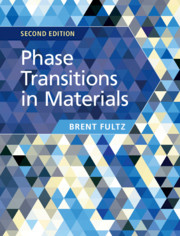Book contents
- Frontmatter
- Contents
- Preface
- Notation
- Part I Basic Thermodynamics and Kinetics of Phase Transformations
- 1 Introduction
- 2 Temperature–Composition Phase Diagrams
- 3 Diffusion
- 4 Nucleation
- 5 Effects of Diffusion and Nucleation on Phase Transformations
- Part II The Atomic Origins of Thermodynamics and Kinetics
- Part III Types of Phase Transformations
- Further Reading
- References
- Index
5 - Effects of Diffusion and Nucleation on Phase Transformations
from Part I - Basic Thermodynamics and Kinetics of Phase Transformations
Published online by Cambridge University Press: 24 April 2020
- Frontmatter
- Contents
- Preface
- Notation
- Part I Basic Thermodynamics and Kinetics of Phase Transformations
- 1 Introduction
- 2 Temperature–Composition Phase Diagrams
- 3 Diffusion
- 4 Nucleation
- 5 Effects of Diffusion and Nucleation on Phase Transformations
- Part II The Atomic Origins of Thermodynamics and Kinetics
- Part III Types of Phase Transformations
- Further Reading
- References
- Index
Summary
Chapter 5 uses concepts of diffusion and nucleation to understand phase transformations in ways beyond a simple usage of equilibrium phase diagrams. A number of nonequilibrium phenomena are described, which show how to understand some phase transformations that have impediments from nucleation and diffusion. In general, the slowest processes are first to cause deviations from states of equilibrium. For faster heating or cooling, however, sometimes the slowest processes are fully suppressed, and the next-slowest processes become important. Nonequilibrium processes in alloy freezing are explained, as is the glass transition. Approximately, Chapter 5 progresses from slower to faster kinetic processes. However, the last section discusses why kinetic processes based on activated state rate theory should bring materials to thermodynamic equilibrium.
Keywords
- Type
- Chapter
- Information
- Phase Transitions in Materials , pp. 109 - 130Publisher: Cambridge University PressPrint publication year: 2020
- 1
- Cited by

